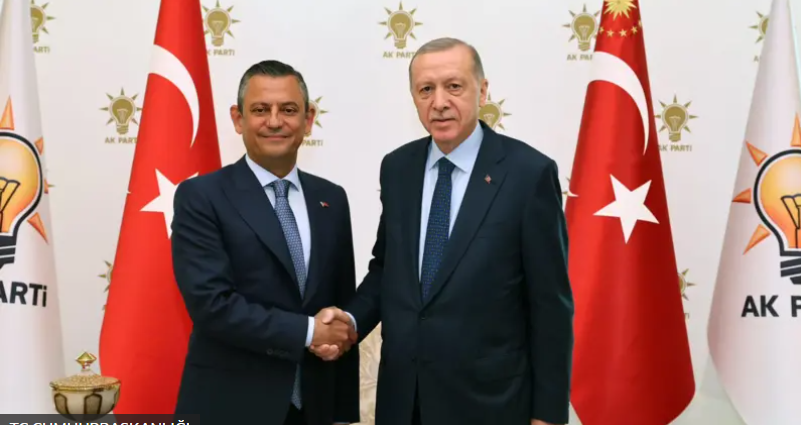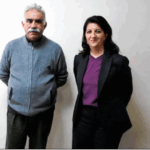The move to install a court-appointed caretaker over the CHP’s İstanbul branch is not an isolated skirmish; it’s a stage direction in a larger production. At News About Turkey, we’ve long argued that Recep Tayyip Erdoğan is trying to engineer a political arena that remains visibly political but functionally non-competitive.
One of the aspects of this strategy is to fracture the opposition (besides intimidation and imprisonment), flood it with procedure, and normalize judicial arbitration of party life—so that, when the time comes, a dynastic handoff to Bilal Erdoğan unfolds with minimal friction for a figure who lacks natural constituency and charisma. The Gürsel Tekin episode fits that script precisely: fracture first, then use the courts to revisit the 2023 congress and seat a de facto “trustee” at the top—plausibly Kemal Kılıçdaroğlu—under color of law. But the very tactics that might smooth a short-term succession can, in the medium run, catalyze the birth of a broad, competence-first centrist alternative—the kind of reformist realignment that once produced the AKP itself.
Yet the biggest political mistake of this cycle didn’t come from the palace; it came from the opposition’s own helm. When Ekrem İmamoğlu was arrested and jailed last March, Turkey witnessed a spontaneous surge of public sympathy and outrage. It was the closest thing the country has seen in years to a non-partisan, cross-class moment—an inflection point when ordinary voters, not just the already-converted, were prepared to say that rules matter and that the winner should be allowed to govern. Özgür Özel should have seized that hour—turning a legal shock into a civic cause. He should have escalated, not managed, the moment: call for sustained, peaceful mobilization; summon crowds from every province to gather in front of Erdoğan’s palace in Ankara. That would have put the government on the defensive and forced a response on rule-of-law terms. It might even have toppled Erdoğan’s government—even at the risk of bloodshed, the potential was real. Instead, the energy bled into statements, studio hits, and internal choreography. History offered a spark; the leadership offered press releases and political statements.
This matters because Erdoğan’s strategy relies on habituation. Voters are meant to get used to the idea that certified outcomes can be “adjusted,” that caretakers can replace elected leaders, that appeals outlast mandates. The Istanbul decision was the migration of municipal trusteeship into a party’s inner circuitry: annul the provincial congress, suspend the delegates, appoint the board, and force the opposition to spend its oxygen on filings. It keeps the scenery of democracy—congresses, committees, ballots—while draining the uncertainty that makes any of it real. And it serves a succession logic: if no rival can consolidate the center, Bilal Erdoğan doesn’t need charisma; he needs a ring with dull blades.
The reason Özel’s hesitation is so costly is that the country’s largest bloc is not the loyalists of either camp but the missing middle—risk-averse citizens who want predictable rules and boring competence in the same breath. These voters are not moved by ideology; they are moved by whether the price of groceries stops jumping, whether buses run on time, whether tenders are clean, and whether their ballot isn’t rewritten in chambers. İmamoğlu’s arrest briefly braided these instincts—fairness and normalcy—into a single, legible grievance. That was the time to flood the zone with peaceful crowds and practical pledges; to frame the fight not as “our hero versus your villain,” but as citizens reclaiming the ground rules that let politics work.
Instead, the party got drawn into the government’s preferred terrain. The palace doesn’t need to win arguments if it can choose the stage. And that is what happened: the debate became who blinked, who betrayed, who broke ranks—when it should have been a pocket-test any undecided voter could recite: What does your vote mean if a first-instance court can erase it?
None of this negates the structural danger to Erdoğan’s plan. Designing a political arena that is political but not competitive solves a short-term problem—a hereditary horizon—but it ages badly. Markets tire of surprises; price anxiety becomes political fatigue. Coalition partners stack IOUs; drift replaces momentum. Most of all, a non-contest cannot manufacture consent for an heir. People will tolerate a strong hand when it delivers; they balk when power looks inherited rather than earned. That is how a script written for an easy handoff in the short run becomes a blueprint for mid-term blowback: a broad, competence-first centrist alternative that speaks the language today’s voters are desperate to hear—stable rules, visible services, merit over inheritance.
That centrist project is not a protest banner; it is a governing offer. It would keep the cultural fluency that İmamoğlu proved possible—conservative manners without majoritarianism, secular assurances without contempt for faith—while scaling municipal normalcy into national policy: transparent procurement, youth apprenticeships, targeted relief on essentials, and visible anti-corruption dashboards. In other words, it would recover the reformist energy that once birthed the AKP, stripped of ideological edge and dynastic baggage.
Can the opposition still build it after the missed moment? Possible—if it treats the miss as a lesson rather than a template. That begins with sequence. First, translate legalese into citizen language and keep it there. Every intervention should come back to the same question of meaningfully counted votes. Second, quarantine the family feud; reconciliation should be a rules-based lane (fair, time-bound congresses with credible oversight), not a daily rerun of grievances. Third, own stability where you still govern. Cities must be living proofs of predictability: on-time maintenance, honest tenders, relief for students and commuters, procurement you can audit from your phone. Fourth, build a ban-resilient bench—visible deputies, a legal war room that moves faster than the next injunction, diaspora and micro-donor rails that don’t collapse when a switch is flipped. Finally, frame the contrast without vendetta. This is not anti-Bilal as a person; it is anti-dynasty as a principle. The yardstick is performance: merit, delivery, accountability.
Can this method turn the tide for the opposition? Depends. Erdoğan understands the limits of his project—including his own and his son’s political shortcomings—which is why he is doubling down on fear: more prosecutions, more procedural tinkering, more caretakers, and more courtroom spectacle than ballot-box contest, all calibrated to keep the political arena non-competitive and to prevent any centrist alternative from ever coalescing. If domestic coercion loses its bite, he may also look outward—flirting with managed crises or even military adventurism against neighboring states or non-state actors—to manufacture polarization and a rally-’round-the-flag effect
By: News About Turkey (NAT)



